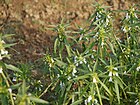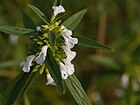Note: This is a project under development. The articles on this wiki are just being initiated and broadly incomplete. You can Help creating new pages.
Difference between revisions of "Leucas lavandulaefolia"
(→Common names) |
|||
| Line 11: | Line 11: | ||
==Common names== | ==Common names== | ||
| − | {{Common names|sa=|en=Leaved leucas|gu=|hi=Halkusa|kn=|ks=|ml=Rudraspushpam|mr=Kuva|pa=|ta=|te=Pulatumni}} | + | {{Common names|sa=|en=Leaved leucas|gu=|hi=Halkusa|kn=ದೆವ್ವ ತುಂಬೆ Devva tumbe, ಗಂಟುತುಂಬೆ Gantutumbe|ks=|ml=Rudraspushpam, Tumba|mr=Kuva|pa=|ta=Tumbai|te=Pulatumni|gu=Zina panno kubo}} |
==Properties== | ==Properties== | ||
Revision as of 10:30, 18 June 2020
Leucas lavandulifolia is an erect, annual plant with much-branched stems 30 - 80cm tall. The plant is harvested from the wild for local use as a food and medicine. It is sometimes cultivated in home gardens for use in local medicine and as a pot herb.
Contents
- 1 Uses
- 2 Parts Used
- 3 Chemical Composition
- 4 Common names
- 5 Properties
- 6 Habit
- 7 Identification
- 8 List of Ayurvedic medicine in which the herb is used
- 9 Where to get the saplings
- 10 Mode of Propagation
- 11 How to plant/cultivate
- 12 Commonly seen growing in areas
- 13 Photo Gallery
- 14 References
- 15 External Links
Uses
Sores, Dermatosis, Roundworms, Malaria, Headaches, Vertigo, Chronic skin diseases, Psoriasis, Scabies, Roundworm.[1]
Parts Used
[[:Category:Herbs with used in medicine|]], stem, leaves, Root.
Chemical Composition
Common names
| Language | Common name |
|---|---|
| Kannada | ದೆವ್ವ ತುಂಬೆ Devva tumbe, ಗಂಟುತುಂಬೆ Gantutumbe |
| Hindi | Halkusa |
| Malayalam | Rudraspushpam, Tumba |
| Tamil | Tumbai |
| Telugu | Pulatumni |
| Marathi | Kuva |
| Gujarathi | Zina panno kubo |
| Punjabi | |
| Kashmiri | |
| Sanskrit | |
| English | Leaved leucas |
Properties
Reference: Dravya - Substance, Rasa - Taste, Guna - Qualities, Veerya - Potency, Vipaka - Post-digesion effect, Karma - Pharmacological activity, Prabhava - Therepeutics.
Dravya
Rasa
Guna
Veerya
Vipaka
Karma
Prabhava
Habit
Identification
Leaf
| Kind | Shape | Feature |
|---|---|---|
Flower
| Type | Size | Color and composition | Stamen | More information |
|---|---|---|---|---|
| {{{5}}} |
Fruit
| Type | Size | Mass | Appearance | Seeds | More information |
|---|---|---|---|---|---|
Other features
List of Ayurvedic medicine in which the herb is used
Where to get the saplings
Mode of Propagation
How to plant/cultivate
The plant is becoming a serious weed in sugarcane fields in Malesia.[4]
Commonly seen growing in areas
Open waste places, Other plantations, Roadsides, Grassland, Fallow land, Paddy dams, Arable land.
Photo Gallery
References
- ↑ Indian Medicinal Plants by C.P.Khare
- ↑ [Chemistry]
- ↑ [Morphology]
- ↑ Cultivation
External Links
- Pages using duplicate arguments in template calls
- Ayurvedic Herbs known to be helpful to treat Sores
- Ayurvedic Herbs known to be helpful to treat Dermatosis
- Ayurvedic Herbs known to be helpful to treat Roundworms
- Ayurvedic Herbs known to be helpful to treat Malaria
- Ayurvedic Herbs known to be helpful to treat Headaches
- Ayurvedic Herbs known to be helpful to treat Vertigo
- Ayurvedic Herbs known to be helpful to treat Chronic skin diseases
- Ayurvedic Herbs known to be helpful to treat Psoriasis
- Ayurvedic Herbs known to be helpful to treat Scabies
- Ayurvedic Herbs known to be helpful to treat Roundworm
- Herbs with used in medicine
- Herbs with stem used in medicine
- Herbs with leaves used in medicine
- Herbs with Root used in medicine
- Herbs with common name in Kannada
- Herbs with common name in Hindi
- Herbs with common name in Malayalam
- Herbs with common name in Tamil
- Herbs with common name in Telugu
- Herbs with common name in Marathi
- Herbs with common name in Gujarathi
- Herbs with common name in English
- Habit - Annual
- Index of Plants which can be propagated by Seeds
- Herbs that are commonly seen in the region of Open waste places
- Herbs that are commonly seen in the region of Other plantations
- Herbs that are commonly seen in the region of Roadsides
- Herbs that are commonly seen in the region of Grassland
- Herbs that are commonly seen in the region of Fallow land
- Herbs that are commonly seen in the region of Paddy dams
- Herbs that are commonly seen in the region of Arable land
- Herbs
- Pages without herbs images





